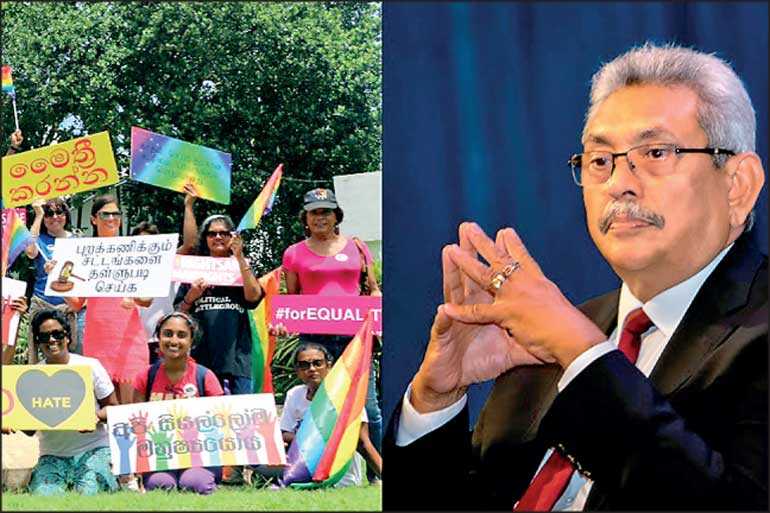Thursday Feb 19, 2026
Thursday Feb 19, 2026
Saturday, 6 March 2021 00:04 - - {{hitsCtrl.values.hits}}

www.starobserver.com.au: In probably a first for a South Asian head of state, Sri Lankan President in a post on Twitter acknowledged the rights of LGBTQI Sri Lankans. Human rights activists said the President’s message was significant as Sri Lanka is one of the 69 countries in the world that has laws that criminalise consensual same-sex acts.
President Gotabaya Rajapaksa posted the message on Twitter on 1 March, a day that is celebrated by the United Nations as ‘Zero Discrimination Day’.
“Today is #ZeroDiscriminationDay. As the President of Sri Lanka I am determined to secure everybody’s right to live life with dignity regardless of age, gender, sexuality, race, physical appearance, and beliefs,” the President posted.
The President’s message was welcomed by many on social media, even as some pointed to the existence of Section 365 of the Sri Lankan Penal Code that criminalises consensual same-sex relations.
Sri Lankan human rights activist and lawyer Aritha Wickramasinghe in a post on Facebook thanked President Rajapaksa “for acknowledging our right to a dignified life free from discrimination”.
“President Rajapaksa becomes the first head of state in Sri Lanka to openly acknowledge the rights of LGBT Sri Lankans. A remarkable statement,” said Wickramasinghe. He contrasted it with Rajapaksa’s predecessor Maithripala Sirisena, “who had espoused homophobia and used terms like ‘butterflies’ to ridicule LGBT people”.
Others like the country’s only openly gay politician and former Finance Minister Mangala Samarweera reminded the President that “it still is not too late to walk the talk”.
“We should start by not labelling as traitors all those who have been wanting to secure everybody’s right to live life with dignity regardless of age, gender, sexuality, race and beliefs,” Samaraweera responded to Rajapaksa’s post.
According to Colombo-based Equal Ground “owing to Sri Lanka’s legal landscape and social stigmas, LGBTIQ community faces discrimination on a daily basis”.
Section 365 and 365 A of the country’s Penal Code say those convicted of “unnatural offences” and “acts of gross indecency” can be punished with a prison term of up to 10 years. The law is not known to have been used against anyone since 1948, however the threat of the law has been used to harass the LGBTQI community.
Section 399 of the law criminalises gender impersonation and has been used to target the transgender community.
Last year, a report by Human Rights Watch (HRW) and Equal Ground, had revealed that Sri Lankan authorities had subjected seven LGBTQI persons to forcible anal and vaginal examinations between 2017-2020 looking for proof of homosexual conduct in their criminal prosecutions.
The President’s post comes even as the country faces a resolution in the United Nations that “expresses serious concern over emerging trends over the past year, which represent clear early warning signs of a deteriorating human rights situation in Sri Lanka”.
The resolution asked Sri Lanka for a “thorough and impartial investigation and, if warranted, prosecution of all allegations of gross human rights violations and serious violations of international humanitarian law”.
(Source: https://www.starobserver.com.au/news/201090/201090)